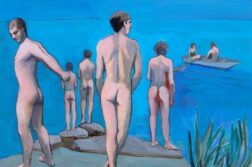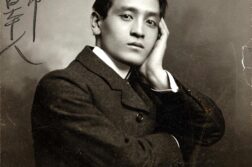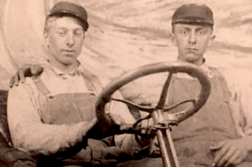When I wrote this, I was an active founder of the Lesbian Avengers, an international organization that trained thousands of lesbians in direct action techniques. It was at the 1993 March on Washington that the Avengers and act-up Women’s Network created the first Dyke March—with 20,000 women, marching together with no permit. These participants brought the marches home to their cities and countries and created a new tradition. We worked on ballot measure campaigns around the country. At its height, the Avengers had 22 chapters on four continents. Then it crashed and burned, as all anarchist organizations must eventually do.
Today, we have virtually no activist movement left at all. But that can’t last forever. I look forward to the work of younger people, and I am excited to see the movement that they will build. They have a tougher job than we did because they are lied to every day by the media, both gay and mainstream, about how free they are, how little oppression still exists, and about the benefits of “tolerance.” But I believe that eventually they will notice that their lived experience does not correspond to the way they are being represented. False representation is ultimately a lot more destructive than no representation at all. And it is finally more confusing.
The same false story about AIDS that was current ten years ago is still being promulgated, namely that self-oppressing gay people were alone until a benevolent straight community heroically overcame its prejudice and rescued them. The thousands of people who forced action on AIDS, and the movement we built, have been forgotten from art and history.
Personally, my response to this has been to work with my collaborator of seventeen years, Jim Hubbard, to create the act-up Oral History Project, a video archive in which surviving members of act-up New York tell the true story of the AIDS crisis, how they changed the world and saved their own lives. (You can view this work at www.actuporalhistory.org/beta.)
— New York, October 2003
__________________________________________
FROM Summer, 1994
Freedom Summer
Gays and lesbians are more visible today than we may have predicted even fifteen years ago. But that visibility has not brought the kind of acceptance and integration that we imagined. Many formerly underground aspects of our lives are now acknowledged in some manner by the general public. But they are positioned as parallel or special interest and are easy to diminish or revile. When an aspect of gay life becomes acceptable for public consumption, it is increasingly defined, not by us, but by what I call institutions of containment.
Clinton’s fiasco last year with gays in the military provides a perfect example of the media’s containment of gay people. The issue put us on the evening news, but truths about gay members of the military were distorted to fit comfortably into the prime-time box. As we sat in our living rooms watching supposedly straight generals, politicians, and newscasters debate whether we should have rights, the absence of openly gay and lesbian people from power was excruciatingly obvious. But even more detrimental was the media’s exclusive focus on the ban’s impact on white male officers. The fact that black women are kicked out of the military for homosexuality at twice the rate of white men was left out of the discourse in both the straight media and the continually racist gay and lesbian press. They created a false public image to fit the mainstream media’s criteria for which lives are important enough to be seen.
Fake visibility occurs on many cultural and political fronts. Until the release this year of Jonathan Demme’s Philadelphia, AIDS has been almost exclusively the territory of gay and lesbian filmmakers, whose films have been ignored. Today, we see that the only publicly acceptable presentation of the AIDS crisis is one created by a straight man. What was it about gay-produced films about AIDS that was unacceptable and that is not present in a work such as Philadelphia? A short list would include gay anger, gay sexuality, the abandonment of gays and lesbians and people with AIDS by their families, the impact of mass death on the individual, and the dimensions and reach of the gay and lesbian community. Now, with the advent of a fake public homosexuality constructed for heterosexual consumption, we have Philadelphia saying it is heterosexuals that have defended and protected gay people with AIDS while other gays lurked meekly in the background. Is this what we had in mind when we imagined visibility?
This parallel existence is also evident in book publishing. For some time now, gay- and lesbian-themed literature has been marketed primarily to homosexual readers by both corporate and independent publishers. In our enthusiasm to identify our own literature, we underestimated how ferociously the dominant culture would refuse to accept these works as a part of American writing. While this isolation initially resulted in the publication and wider distribution of gay and lesbian work, it reinforced straight people’s desire to stigmatize the work and separate it from the U.S. literary mosaic. As it now stands, black women writers are read by white readers, and Jewish writers are read by Christian readers. But for the most part, only a homosexual audience reads openly gay writers.
Of course, the most important element of gay and lesbian life to be affected by parallel visibility is political organizing. For years, the gay movement was dominated by an assimilationist political style aimed at educating the heterosexual public about gay life, with a particular emphasis on coming out. But today, with openly gay and lesbian people in the media every day, we are still losing draconian anti-gay ballot measures by votes of two to one. Does this mean the general public cannot be convinced to accept lesbians and gays as equals? If so, what are the implications for political organizing? Recent trends in grass roots activism reflect the conclusions of Derrick Bell, who argues in his book Faces at the Bottom of the Well that racism is a permanent state. If we can extrapolate that theory to sexism, anti-Semitism, and homophobia, then which way forward for lesbian and gay organizing? Clinton’s sellout on the military ban was one of the more dramatic failures of coalition politics in recent memory. But what can we win alone?
Public discourse in the United States is dominated today by the politics of resentment. People who have always enjoyed basic civil rights are being told by the gay community and other disenfranchised groups that they have those rights only by accident of birth, not, as they believe, because of an inherent and deserving superiority. The response has been a widespread, multifaceted propaganda campaign to dismiss all freedom movements as “politically correct.” Our coming out may not have changed straight people, but it has dramatically transformed us. We have a higher level of dignity, resolve, and unity than ever before, and we are in an excellent position to strategize our political mission for the next 25 years.
The time has come to go beyond visibility to movement building. Trying to convince heterosexuals that we are fully human is no longer a viable strategy. We now need to consolidate our base and win political power. The first step is to shift our focus away from Washington to local communities. This November at least thirteen anti-gay ballot measures will be put to popular vote. Many of these elections will take place in small towns and rural areas where local gay communities may not have the organizing skills and resources to win. To date, most communities fighting ballot measures have stayed in the closet, framing their campaigns around vague anti-discrimination rhetoric. But the Right has used homosexuality overtly in its propaganda, so our silence comes off as hiding and shame. Historically, every campaign that has relied on the closet strategy to fight anti-gay measures has lost. Most important, such closemouthed campaigns cannot reach out adequately to gay and lesbian people in the affected areas. We do not register these people to vote, and we do not help them participate in the process of political rebellion.
Organizations such as the Lesbian Avengers have already run a grass roots organizing project in Maine, and we are now preparing a few more for the November elections. Other gay and lesbian groups are also gearing up for the fight. This is something that we can all participate in—with or without existing organizations. We need to create our own Freedom Summer, in which gay and lesbian people, especially young people, travel across the country to join local communities in fighting anti-gay measures. We must not be tempted by Washington’s false promises to abandon our brothers and sisters on the front line. We need to act town by town, county by county, in hand-to-hand combat with the religious Right.
Finally, there is another battle we must wage, one we have put off for 25 years because it is the most daunting task we have ever faced. The fact is, lesbians and gays and people with AIDS have stood consistently alone. We have not received the political and emotional support we deserve from our neighbors, families, and co-workers. No matter how we differ from each other, most lesbians and gays have been shamefully treated at some point, and many of us have been abandoned by our families. They have allowed us to live with fewer rights and protections than they enjoy, and they have failed to mobilize on our behalf. In fact, they are often our toughest and most painful opposition. We keep this as our last secret, something we discuss with each other but never bring into the public discourse.
As always when we come forward as individuals, we are pathologized and dismissed. Perhaps if we come collectively, the initial reaction will be the same. But the process strengthens us and provides the sense of entitlement and determination for justice that we need and deserve.
Sarah Schulman, a playwright and novelist, is adapting isaac Singer’s Enemies, A Love Story, for the stage.





